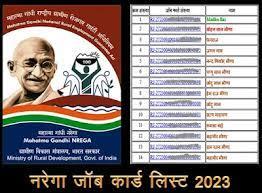Introduction:
The Mahatma Gandhi National Rural Employment Guarantee Act (NREGA) has been a cornerstone in India's efforts to alleviate poverty and empower rural communities since its inception in 2005. One of the key components of the NREGA program is the issuance of Job Cards, providing rural households with access to guaranteed employment opportunities. This article explores the significance of the Nrega Job Card List in transforming the lives of individuals in rural India.
Understanding NREGA Job Cards:
The NREGA Job Card serves as a crucial document that facilitates access to employment under the NREGA scheme. Issued to rural households, this card contains essential details such as the names of eligible individuals, their photographs, and a unique registration number. Possession of a valid Job Card entitles the holder to a minimum of 100 days of employment in a financial year, thereby ensuring a source of income for families in need.
Empowering Rural Communities:
1. Poverty Alleviation:
The primary objective of the NREGA Job Card List is to alleviate poverty by providing rural households with a reliable source of income. Through guaranteed employment, families can meet their basic needs, such as food, shelter, and education, leading to an improvement in their overall standard of living.
2. Skill Enhancement:
NREGA not only provides employment but also serves as a platform for skill development. Workers engage in various projects such as water conservation, road construction, and afforestation, acquiring valuable skills that can enhance their employability beyond the NREGA program.
3. Social Inclusion:
The program promotes social inclusion by ensuring that job opportunities are accessible to all sections of the community, irrespective of caste, gender, or socio-economic background. This helps in reducing disparities and fostering a sense of equality among rural populations.
Implementation and Execution:
1. Registration Process:
The first step towards availing the benefits of the NREGA program is the registration of eligible households. This involves submitting an application with necessary details to the local Gram Panchayat. Once approved, the household is issued a Job Card.
2. Work Allocation:
The allocation of work under NREGA is a decentralized process carried out by Gram Panchayats. They identify and prioritize projects based on local needs, ensuring that the community actively participates in the decision-making process. This bottom-up approach enhances the effectiveness of the program.
3. Payment Mechanism:
NREGA payments are made directly to the workers' bank accounts, promoting transparency and reducing the scope for corruption. The timely disbursement of wages ensures that the intended beneficiaries receive the full benefit of their labor, further contributing to poverty reduction.
Challenges and Solutions:
1. Delayed Payments:
One of the persistent challenges faced by the NREGA program is the delayed payment of wages to workers. This issue can be addressed by streamlining the payment process, implementing digital tools, and strengthening monitoring mechanisms to ensure timely disbursement.
2. Implementation Disparities:
Disparities in the implementation of the NREGA program exist across different states and regions. Standardizing implementation procedures, conducting regular audits, and sharing best practices can help bridge these gaps and ensure uniform benefits for all beneficiaries.
3. Awareness and Participation:
In some areas, lack of awareness and low participation rates hinder the effectiveness of the NREGA program. Robust awareness campaigns, community mobilization efforts, and the involvement of local leaders can help overcome these challenges and encourage greater participation.
Impact on Rural Development:
1. Infrastructure Development:
The projects undertaken through NREGA contribute to the development of essential rural infrastructure. This includes the construction of roads, water conservation structures, and irrigation facilities, thereby enhancing the overall quality of life in rural areas.
2. Environmental Sustainability:
NREGA projects often focus on environmentally sustainable practices such as afforestation and soil conservation. This dual benefit not only provides employment but also contributes to ecological balance and resilience against climate change.
3. Economic Stimulus:
By injecting money directly into rural economies, NREGA acts as an economic stimulus. The wages earned by workers are spent locally, boosting demand for goods and services, and fostering economic growth in rural areas.
Conclusion:
The NREGA Job Card List stands as a testament to India's commitment to inclusive growth and poverty eradication. By providing guaranteed employment to rural households, the program not only addresses immediate economic needs but also fosters sustainable development through skill enhancement and infrastructure projects. As India continues to evolve, the NREGA program remains a vital instrument in ensuring that the benefits of progress reach every corner of the nation, creating a more equitable and empowered society.

